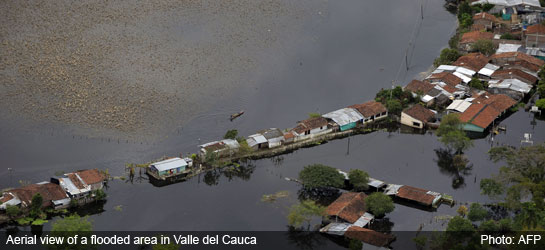
Colombia’s government Thursday extended for 20 days a state of emergency to deal with relief efforts from torrential rains that have caused the worst flooding and mudslides in years.
The office of President Juan Manuel Santos said in a statement the extension of the state of emergency, which was declared last month, is needed so the government can attend to the more than 2 million people affected by flooding, landslides and other problems.
Nearly 300 people have died in Colombia since the drenching rains began several months ago, while tens of thousands have been left homeless and food crops have been damaged.
The government began to distribute 1 trillion pesos ($526 million) Thursday to mayors and governors in the areas hardest hit by the rains. Santos’ office said the money will go for food, temporary housing and health needs. It said a total of COP5 trillion ($2.6 billion) will soon be available for all affected areas.
To help pay for the relief efforts, Santos said on Christmas Eve he’s considering increasing the number of people required to pay taxes on personal assets.
The government says relief and recovery from the disaster could end up costing a total of COP10 trillion.
Beyond the immediate fiscal costs for food and shelter, economists have warned about the macroeconomic damage the rains are causing, primarily to inflation.
The government’s consumer price index for December, announced Wednesday, came in at 0.65%, which was more than double what economists were expecting in a survey last week. That left full-year inflation at 3.17%, putting it within the government’s 2% to 4% target range, but well above forecasts of a 2.8% increase. Food prices shot up 1.65% in December.
Some analysts note that since the higher inflation is mostly a result of food supply issues due to the rain, it’s likely only a temporary problem and central bankers shouldn’t be overly concerned. Others, however, warn higher food prices could spur broader price hikes.
Amid the rising food prices, the government late last month raised its monthly minimum wage 3.4% to COP532,500 ($280) even though employers were asking for an increase of no more than 3.0%. The minimum wage adjustment also affects other payments such as pensions and traffic tickets.
“Let me just say this is just the beginning of the trend,” said Andres Jimenez, an analyst at Interbolsa, referring to the higher-than-expected inflation data. (Dan Molinski / Dow Jones Newswires)

